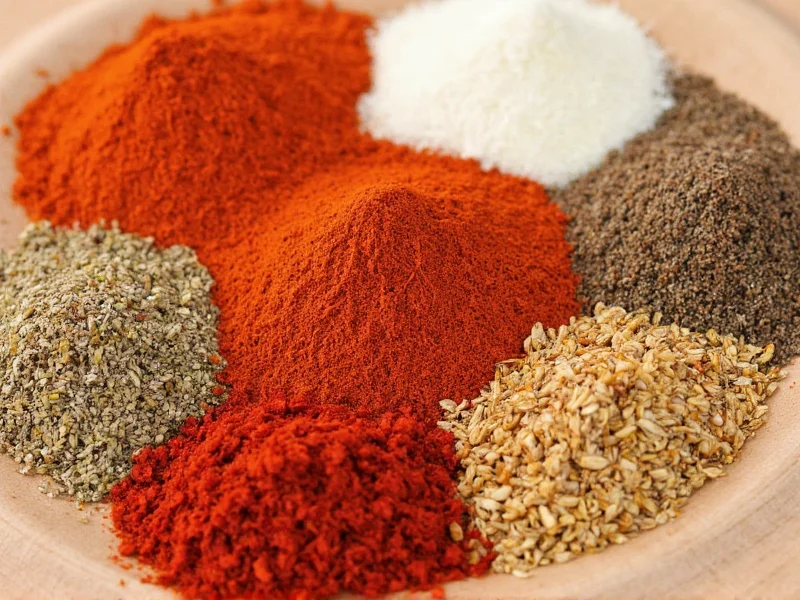Many people tracking their daily calorie intake wonder whether spices significantly impact their totals. This concern often stems from confusion about how minimal ingredients affect nutritional calculations. Understanding the actual calorie contribution of spices can help you make informed decisions in your dietary planning without unnecessarily restricting flavorful cooking.
The Science Behind Spice Calories
When examining calorie content of common spices, it's essential to understand measurement principles. Calorie values are determined through laboratory testing using bomb calorimetry, which measures the energy released when a substance is completely burned. For spices, the extremely small serving sizes—typically 1/4 to 1 teaspoon—result in negligible energy content.
Nutrition labels often list spices as having 0 calories because they fall below the 5-calorie threshold that labeling regulations permit to be rounded down. This isn't misleading; it reflects the scientific reality that these amounts simply don't contribute meaningful energy to your diet.
Calorie Reference Guide for Common Spices
| Spice | Calories per Teaspoon | Calories per Tablespoon | Typical Serving Size in Recipes |
|---|---|---|---|
| Black Pepper | 2 | 6 | 1/4-1/2 tsp |
| Cinnamon | 6 | 18 | 1/2-1 tsp |
| Turmeric | 3 | 9 | 1/2 tsp |
| Paprika | 6 | 18 | 1 tsp |
| Cumin | 8 | 24 | 1 tsp |
| Garlic Powder | 6 | 18 | 1/2 tsp |
| Onion Powder | 7 | 21 | 1/2 tsp |
| Chili Powder | 6 | 18 | 1/2 tsp |
| Nutmeg | 2 | 6 | 1/4 tsp |
| Cloves | 2 | 6 | 1/4 tsp |
As shown in this reference table of calorie count of dried spices, even the most calorie-dense common spices contribute minimally to your daily intake. Consider that a typical recipe might use 1-2 teaspoons of spices total—adding perhaps 5-15 calories maximum to the entire dish, which is usually divided among multiple servings.
Practical Implications for Calorie Counting
When tracking your daily intake, do spices add calories to food in a meaningful way? For most people, the answer is no. The calorie contribution from spices falls well below the margin of error in most food tracking systems. Even if you're following an extremely precise diet plan, the difference made by spices would be negligible compared to other ingredients.
Nutrition professionals generally agree that spices for weight loss are beneficial not just for their negligible calorie content, but because they enhance flavor without requiring added fats, sugars, or salt. This makes them valuable tools for maintaining dietary adherence while enjoying flavorful meals.
Common Misconceptions About Spice Calories
Several myths persist about spice calories that deserve clarification:
- "Spice blends contain hidden calories" - While some commercial blends may contain fillers, pure spice blends still contribute minimal calories. Always check labels if concerned about additives.
- "Spices boost metabolism significantly" - While some spices like cayenne may have minor thermogenic effects, these are not substantial enough for meaningful weight loss.
- "All spices should be measured precisely" - For the vast majority of dietary goals, precise measurement of spices isn't necessary due to their minimal calorie contribution.
Smart Cooking Strategies With Spices
Understanding that most spices have low calorie spice options allows you to maximize flavor without compromising dietary goals. Consider these practical approaches:
- Use spice rubs instead of sugary marinades for proteins
- Create flavorful vegetable dishes without added oils by using generous spice blends
- Enhance plain grains like quinoa or rice with spice mixtures rather than butter or oil
- Make flavorful soups and stews with spice bases instead of roux or cream
Professional chefs often rely on spice combinations to create complex flavors while keeping dishes light and health-conscious. This approach aligns perfectly with using spices without adding calories to your cooking repertoire.
When Spice Calories Might Matter
While spices generally don't affect calorie counts meaningfully, there are rare scenarios where precision matters:
- Medical nutrition therapy requiring extreme precision
- Competitive bodybuilding during strict contest preparation
- Certain metabolic conditions requiring meticulous tracking
Even in these cases, the impact remains small—typically less than 1% of total daily calories. For the vast majority of people tracking calories for general health or moderate weight management, spice calories can be safely disregarded in calculations.











 浙公网安备
33010002000092号
浙公网安备
33010002000092号 浙B2-20120091-4
浙B2-20120091-4